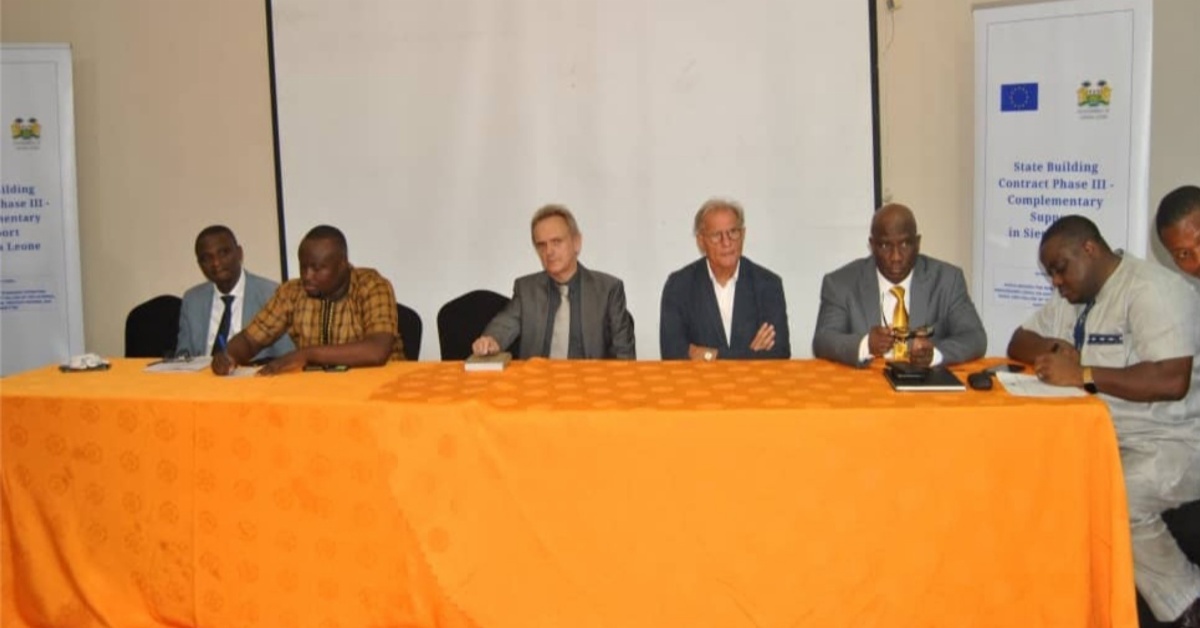The Ministry of Finance, in collaboration with the European Union and the Government of Sierra Leone, has on June 12, 2023 launched a three-day workshop aimed at familiarizing stakeholders with the newly developed Standard Operating Procedures (SOPs) for Audit Follow-up.
The workshop, which commenced on Monday, is targeting Heads of Internal Audit and Audit Follow-up Teams, Process Owners, and members of the Audit Committee.
Taking place at the Country Lodge Complex in Freetown, the workshop opened with remarks from Dr. Claudius Williams Tucker, Chairman of the Government Audit Committee. Dr. Tucker emphasized that the issuance of an audit report is not the final step, but rather, the implementation of the report’s recommendations and findings holds greater significance. The purpose of the new SOPs is to streamline procedures and reduce the volume of reporting in annual audit reports. It also ensures that issues raised during external audits are effectively addressed.
Dr. Tucker highlighted the importance of independence for the roles of internal auditors and urged them to act professionally and autonomously. He acknowledged that some auditors face challenges from vote controllers but expressed optimism that progress would be made towards achieving independence. Furthermore, Dr. Tucker voiced his belief that the Internal Audit Department should not operate under the Ministry of Finance, stating that being the “judge and jury” in one’s own case compromises objectivity. He urged stakeholders to make the most of the workshop’s outcomes and contribute to improving governance and risk management procedures within the government.
During the workshop, Kandeh Sesay, the Director of Internal Audit at the Ministry of Finance, presented the objectives and scope of the Audit Follow-up Standard Operating Procedures. Sesay mentioned that the Ministry, with support from its partners, had developed the SOPs Manual on Audit Follow-up in response to the need for enhanced fiscal discipline, efficient resource allocation, effective service delivery, and accountability. The SOPs aim to determine the status of audit issues, confirm the implementation of executive commitments, and disseminate audit follow-up information to enhance governance and accountability.
Regarding the scope, Sesay clarified that the SOPs Manual encompasses all Ministries, Departments, and Agencies (MDAs), Public Enterprises, and Local Councils. It covers audit findings and recommendations from both internal and external audit reports, including those published by the Public Accounts Committee (PAC) or parliament.
Abdul Rahman Koromah, the Deputy Director of Internal Audit at the Ministry of Finance, discussed the roles and responsibilities of auditors in the follow-up process. He defined the Audit Follow-up as the final phase of the audit process, focusing on evaluating the adequacy, effectiveness, and timeliness of actions taken in response to reported findings and recommendations. Koromah cited legal mandates that require Internal Audit to review the implementation of recommendations from the Auditor General and other external auditors. He emphasized the need for a follow-up process to monitor and ensure effective implementation of management actions.
Koromah also highlighted the importance of a system for tracking and monitoring recommendations, suggesting the use of software programs, spreadsheets, or other tools to monitor the implementation of action plans within established timelines.
The workshop aims to equip stakeholders with a clear understanding of the new SOPs for Audit Follow-up and strengthen the follow-up processes to enhance accountability, governance, and financial management within the Sierra Leonean government.




 Post a comment
Post a comment









